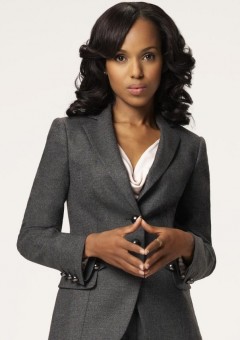in·ter·sec·tion·al·i·ty
ˌintərsekSHəˈnalədē/ <---- this is super helpful, right?
noun
- the interconnected nature of social categorizations such as race, class, and gender as they apply to a given individual or group, regarded as creating overlapping and interdependent systems of discrimination or disadvantage."through an awareness of intersectionality, we can better acknowledge and ground the differences among us"
Ok, so what exactly does that mean? As human beings, there are many (many many many) factors that come together to make us who we are and that create the lens through which we see the world and also impact the way the world sees us. Intersectionality argues that systems of oppression, also sometimes referred to or expressed as -isms (racism, sexism, ableism, heterosexism, etc.) do not exist in a vacuum. Instead, these systems intersect (see what they did there?) to create complex and multidimensional forms of oppression and discrimination.
For example, let us consider Olivia Pope. This is Olivia:
Olivia is a lawyer and Washington, DC "problem solver." She's also (mostly) fictional and the best dressed woman in DC. Here she is in an amazing white hat:

Olivia Pope identifies as both a cisgender female and, though I don't know for sure how she racially and/or ethnically identifies, for the sake of this explanation let's assume she identifies as African American. Living in the US, we know sexism exists. We also know that racism exists. Intersectionality suggests that, for Olivia, racism and sexism will overlap and interrelate and create systems of oppression unique to cisgender females who identify as African American. But we can't stop there because we also know that not all cisgender females who identify as African American have the same experiences with oppression; identities are more complicated and complex that just gender, biological sex and race.
Now, when talking about Olivia, she also has several privileged identities including education (she is a well-educated lawyer), socioeconomic status (said law degree, upbringing, and general brilliance and badassery has led her to financial success. Her apartment is bonkers), sexual orientation (she has amorous relationships with the most powerful men in the world so she's doing alright for herself), ability status (she presents as physically able-bodied and does not appear to have a mental or developmental disability), and gender identity (her gender and biological sex identities correlate). These factors, in addition to many others, will impact how Olivia experiences oppression and discrimination. Now, many of these privileged identities are also shared with Mellie Grant, fellow Scandal character. Here's Mellie:

Intersectionality suggests that, even though Olivia and Mellie have many similar identity factors (both well-educated, wealthy, heterosexual, cisgendered and able-bodied), the experiences of -isms, which for the sake of this example are being focused on sexism and racism, will be different for both women. Dominant gender and racial expectations, stereotypes, misconceptions and narratives intersect, intermingle and work together to create complex and multidimensional systems of oppression that are disparate between individuals with the same gender-identity and different racial identities, as well as any other combination of identity factors. It's important to note here that intersectionality transcends race and gender identities. It has historically been applied to race and gender but I believe it can be related to all intersections of oppression (ableism and heterosexism, classism and xenophobia, etc.).
Another excellent example and one of the moist poignant demonstrations of intersectionality to me is Sojourner Truth's "Aint I A Woman" speech. Though the exact verbiage she used has been contested, Sojourner Truth pointed out elements of intersectionality long before their time. In this speech, she is highlighting that, although she identified as a woman, the societal expectations for her, having been born into slavery, were considerably different than for white women.
This is been a not brief and not perfect explanation of what intersectionality is. Next up, the why it's so important.
For example, let us consider Olivia Pope. This is Olivia:
 |
| Image source] |
Olivia is a lawyer and Washington, DC "problem solver." She's also (mostly) fictional and the best dressed woman in DC. Here she is in an amazing white hat:
Olivia Pope identifies as both a cisgender female and, though I don't know for sure how she racially and/or ethnically identifies, for the sake of this explanation let's assume she identifies as African American. Living in the US, we know sexism exists. We also know that racism exists. Intersectionality suggests that, for Olivia, racism and sexism will overlap and interrelate and create systems of oppression unique to cisgender females who identify as African American. But we can't stop there because we also know that not all cisgender females who identify as African American have the same experiences with oppression; identities are more complicated and complex that just gender, biological sex and race.
Now, when talking about Olivia, she also has several privileged identities including education (she is a well-educated lawyer), socioeconomic status (said law degree, upbringing, and general brilliance and badassery has led her to financial success. Her apartment is bonkers), sexual orientation (she has amorous relationships with the most powerful men in the world so she's doing alright for herself), ability status (she presents as physically able-bodied and does not appear to have a mental or developmental disability), and gender identity (her gender and biological sex identities correlate). These factors, in addition to many others, will impact how Olivia experiences oppression and discrimination. Now, many of these privileged identities are also shared with Mellie Grant, fellow Scandal character. Here's Mellie:

Intersectionality suggests that, even though Olivia and Mellie have many similar identity factors (both well-educated, wealthy, heterosexual, cisgendered and able-bodied), the experiences of -isms, which for the sake of this example are being focused on sexism and racism, will be different for both women. Dominant gender and racial expectations, stereotypes, misconceptions and narratives intersect, intermingle and work together to create complex and multidimensional systems of oppression that are disparate between individuals with the same gender-identity and different racial identities, as well as any other combination of identity factors. It's important to note here that intersectionality transcends race and gender identities. It has historically been applied to race and gender but I believe it can be related to all intersections of oppression (ableism and heterosexism, classism and xenophobia, etc.).
Another excellent example and one of the moist poignant demonstrations of intersectionality to me is Sojourner Truth's "Aint I A Woman" speech. Though the exact verbiage she used has been contested, Sojourner Truth pointed out elements of intersectionality long before their time. In this speech, she is highlighting that, although she identified as a woman, the societal expectations for her, having been born into slavery, were considerably different than for white women.
This is been a not brief and not perfect explanation of what intersectionality is. Next up, the why it's so important.